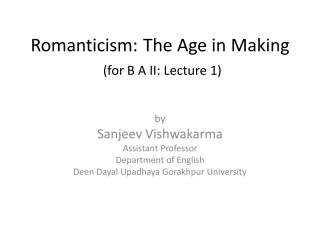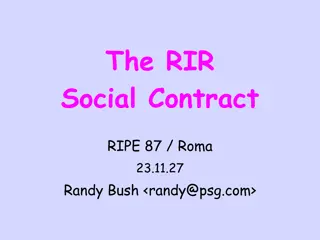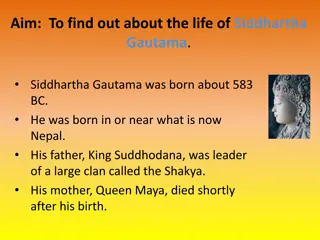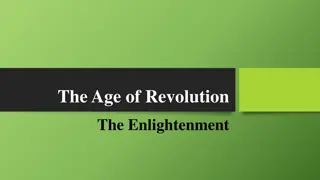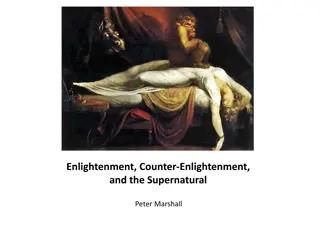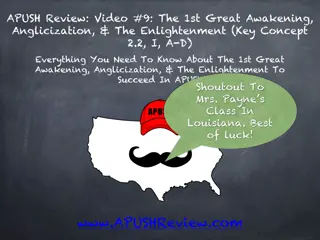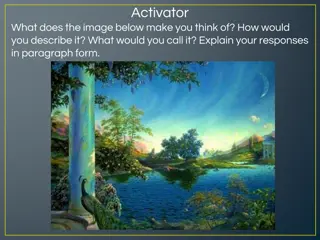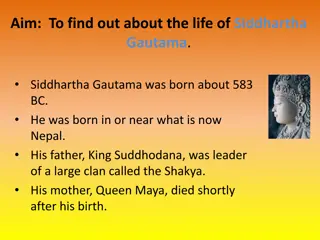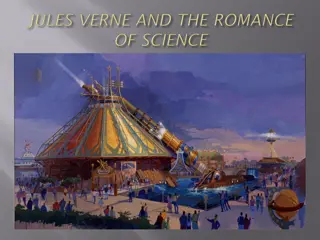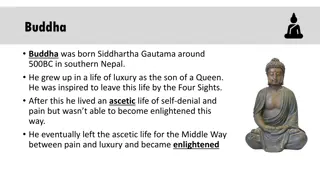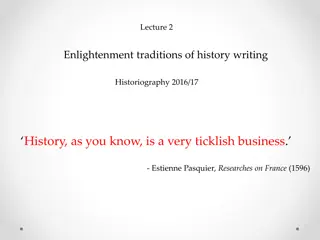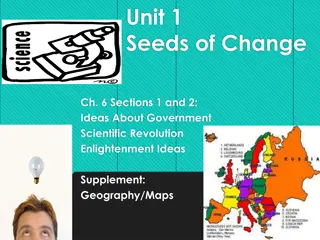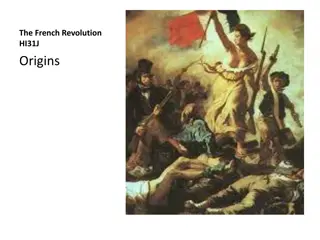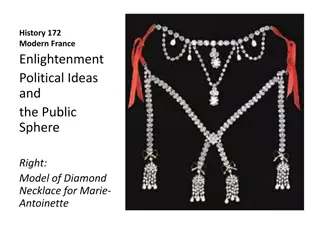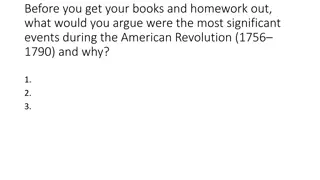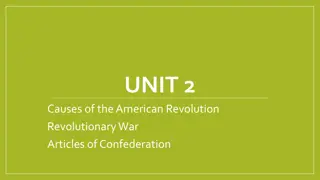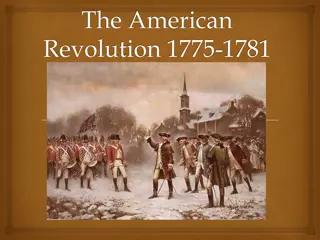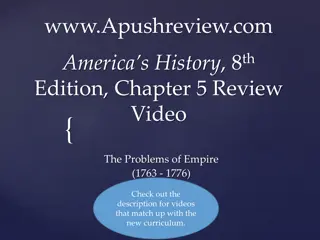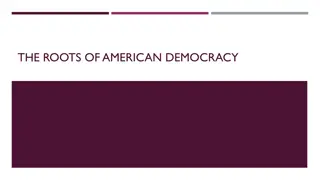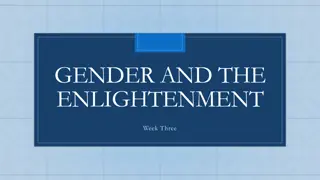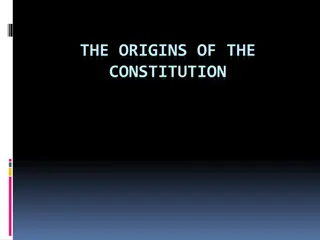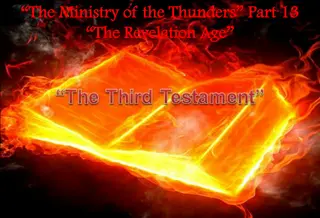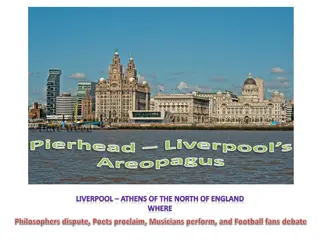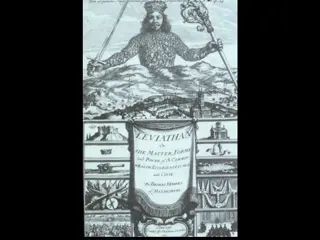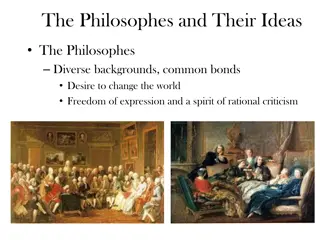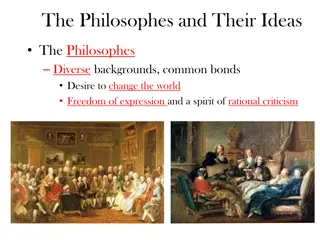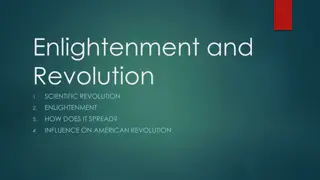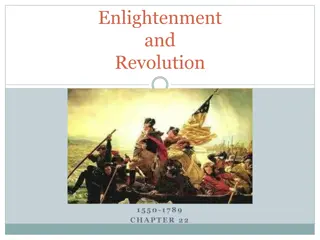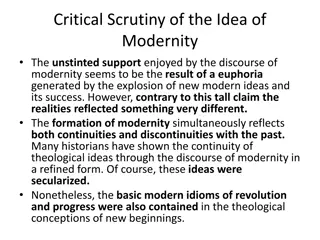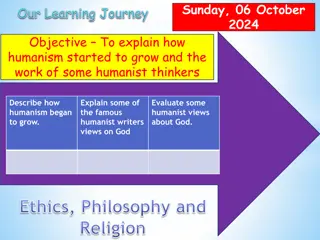Romanticism: The Age in Making
Explore the origins and characteristics of Romanticism in this informative lecture, covering the Enlightenment, American Independence, and the shift away from Enlightenment Neo-classicism.
19 views • 20 slides
Liberty & The Age of Enlightenment The American Battlefield Trust
The Age of Enlightenment, with its emphasis on natural law, liberty, progress, and constitutional government, greatly influenced American thinking and the Revolutionary War. Key figures like John Locke and Sir William Blackstone contributed ideas of social contract and law that shaped American gover
2 views • 15 slides
Understanding RIPE and the Social Contract in the Age of Enlightenment
The RIPE Social Contract delves into the theory of social contracts originating from the Age of Enlightenment. It explores the legitimacy of the state's authority over individuals and discusses the expectations and roles of RIPE, NCC, and RIRs within the internet ecosystem. RIPE's objective is to co
0 views • 33 slides
The Life of Siddhartha Gautama: A Journey to Enlightenment
Siddhartha Gautama, born around 583 BC in Nepal, was destined for greatness. Despite being shielded from the harsh realities of life, he was deeply moved by the suffering he witnessed and left his luxurious life at the palace in search of enlightenment. Renouncing his princely status, Siddhartha bec
0 views • 7 slides
Enlightenment Thinkers and Their Ideals
The Age of Revolution was marked by influential Enlightenment thinkers such as Thomas Hobbes, John Locke, Montesquieu, and Jean-Jacques Rousseau. These philosophers explored human nature, government, and society, shaping modern political thought. Hobbes emphasized a pessimistic view, advocating for
2 views • 9 slides
Insights into Buddhism: History, Philosophy, and Schools
Buddhism, a spiritual tradition focused on personal development and attaining deep insight into life, boasts 376 million followers globally. Rooted in the teachings of the Buddha, it emphasizes reaching nirvana through morality, meditation, and wisdom. The history of Buddhism traces back to Siddhart
0 views • 33 slides
Enlightenment, Counter-Enlightenment, and the Supernatural
The relationship between religion and the Enlightenment was characterized by a shift towards viewing them as non-antagonistic entities, despite some lingering conflicts. While the Enlightenment aimed to combat religious bigotry and superstition, it did not eradicate supernatural beliefs entirely, le
0 views • 8 slides
The 1st Great Awakening, Anglicization, & The Enlightenment in APUSH
This content covers key concepts in APUSH related to the 1st Great Awakening, Anglicization, and the Enlightenment. It discusses the religious revival, emergence of new sects, Enlightenment ideas, Anglicization of the colonies, and Britain's mercantilism and imperial aims. The impacts on colonial so
0 views • 10 slides
Exploring Utopian Ideals through Imagery and Song
The concept of Utopia, an ideally perfect place or society, is explored through various images and songs. The imagery delves into the definition, concepts, religious and scientific connections, varieties, and the song "Imagine" by John Lennon reflects utopian ideals. The Black Eyed Peas' song "Where
0 views • 9 slides
The Life Journey of Siddhartha Gautama: From Prince to Buddha
Siddhartha Gautama, born in 583 BC in Nepal to King Suddhodana and Queen Maya, embarked on a profound life journey. Despite being raised in luxury, he encountered the harsh realities of aging, sickness, and death, prompting him to renounce his princely life in search of spiritual enlightenment. Unde
0 views • 6 slides
Impact of the Industrial Revolution on Society and Ideals
The Industrial Revolution, spanning from 1760 to the late 1800s, revolutionized manufacturing, leading to improved living standards in the developed world. Mechanization, new energy sources, steam engines, and railways transformed production and transportation, fostering innovation. Despite the Fren
1 views • 15 slides
The Life and Teachings of Buddha
Buddha, born as Siddhartha Gautama around 500BC in Nepal, left a life of luxury to seek enlightenment after encountering the Four Sights. He eventually found enlightenment through the Middle Way, understanding the Four Noble Truths and following the Eightfold Path. His teachings on suffering, imperm
0 views • 9 slides
Renaissance Historiography: Writing Histories in the Enlightenment Era
The Enlightenment period saw a shift in historical writing towards valuing the past for its own sake. Scholars like Francesco Petrarch and Estienne Pasquier explored different approaches to interpreting history, incorporating philology, individual chronicles, and the portrayal of great men and women
0 views • 35 slides
Seeds of Change: Government, Science, and Enlightenment in European History
Explore the evolution of government, scientific revolution, and Enlightenment ideas in Europe through monarchies, the Scientific Revolution's impact on society, and the Age of Reason. Uncover the shift towards questioning authority and the pursuit of logic and reason. Delve into the significance of
0 views • 22 slides
Exploring Anti-Enlightenment Traditions in the EU
This text delves into the concept of the anti-Enlightenment tradition and its influence on cynicism within the European Union. It analyzes the ideological roots, cultural implications, and political manifestations of this tradition, contrasting it with Enlightenment principles such as human rights,
0 views • 9 slides
Enlightenment Philosophers and Their Influence on the French Revolution
The French Revolution was influenced by Enlightenment philosophers like Thomas Hobbes, Rousseau, Voltaire, and Montesquieu. Their ideas on social contracts, collective sovereignty, enlightened absolutism, and the need for checks and balances challenged the traditional Ancien Régime's feudalism, pri
0 views • 26 slides
Enlightenment Political Ideas in Modern France
The Enlightenment era in Modern France brought forth significant political ideas and discussions, including Thomas Hobbes' concept of social contract and Rousseau's emphasis on collective sovereignty. Montesquieu advocated for checks-and-balances in government, while Voltaire promoted enlightened ab
0 views • 21 slides
A Comparative Analysis of the American and French Revolutions
The American and French Revolutions were significant events during the late 18th century. Both revolutions were driven by Enlightenment ideals, concern for liberty, and push for new governance but had differences in violence, outcomes, and influence. While the American Revolution led to independence
0 views • 9 slides
The 7 Stages of Spiritual Awakening: A Journey to Enlightenment
The path of spiritual awakening is a profound journey that leads to deep inner transformation and enlightenment. visit us :- \/\/mystickentah.com\/
0 views • 13 slides
Causes of the American Revolution and Enlightenment Influence
Explore the causes of the American Revolution, from key events and legislation to influential figures like George Washington and Thomas Jefferson. Discover the impact of Enlightenment thinkers like John Locke and Baron de Montesquieu on the revolutionary ideas that shaped American history.
0 views • 33 slides
The American Revolution: Causes and Events
The Age of Revolutions in the late 18th century saw the American Revolution unfold, driven by factors like Enlightenment ideals, taxation disputes, and events like the Boston Massacre and Tea Party. The British government's actions and the formation of the First Continental Congress in 1774 further
0 views • 43 slides
Challenges of Empire: From Proclamation to Rebellion
During the period of 1763-1776, the British Empire faced challenges in America resulting from increased taxes, acts restricting colonial autonomy, and resistance from colonists. This led to a series of events including the Currency Act, Sugar Act, Stamp Act, and Townshend Acts, triggering protests,
0 views • 11 slides
Exploring Democracy, Government Ideals, and Global Impact: A Comprehensive Analysis
Delve into the roots of American democracy, government ideals, and political scenarios in the Middle East and North Africa. Analyze the impact of the Arab Spring, U.S. responses, and Trump's immigration ban within the region. Reflect on governmental structures, revolutions, and foreign policy implic
0 views • 76 slides
Gender and the Enlightenment: Understanding Perspectives on Gender Roles
This study delves into the Enlightenment period, exploring the views on gender, female participation, men and feminism. It discusses key figures like Jean-Jacques Rousseau and their beliefs on gender distinctions. The text examines how education was perceived to shape gender roles within society, sh
0 views • 24 slides
The Path to American Independence: Constitution, Revolution, and Ideals
Explore the historical journey of America's independence, from the origins of the constitution and the road to revolution, to declaring independence and the influence of English heritage on American ideals. Discover the key roles of figures like John Locke and Thomas Jefferson, and how the American
0 views • 29 slides
The Age of Revelation: A Time of Ultimate Spiritual Enlightenment
We are experiencing a profound era of revelation like never before in the history of Sonship. This period transcends previous ages by presenting a comprehensive and perfect view of the divine plan. Through cognitive revelation, believers are sharpening their spiritual logic and intellect, embodying
0 views • 33 slides
Science-Based Global Enlightenment in the Quantum-Digital Age
Global Enlightenment in the Quantum-Digital Age explores the urgent need for a science-based approach to address climate change and prevent environmental crises that could lead to a dead planet. It emphasizes the shift from a Hyper-Expansionist socio-economic system to a Sane, Humane, Ecological one
0 views • 25 slides
Insights into the Enlightenment Thinkers: Philosophers of Change
The Enlightenment era marked a shift towards reason and enlightenment, with thinkers like Locke, Hobbes, Montesquieu, Rousseau, and Voltaire advocating for progress, natural law, and individual rights. Each philosopher contributed unique ideas to reshape societal structures, challenging traditional
0 views • 18 slides
Evolution of Criminal Law and Thought: From Pre-Classical Era to Enlightenment
Explore the progression of criminal law and thought from the Pre-Classical School of Thought to the Enlightenment era. Delve into concepts like folkways, mores, and the origins of criminal law, including examples such as societal norms, dress codes, and supernatural explanations for behaviors during
0 views • 23 slides
Enlightenment Thinkers and Their Impact on Society
Explore the ideas and influence of key Enlightenment thinkers such as Montesquieu, Condorcet, Voltaire, and John Locke. Discover their groundbreaking works and beliefs on freedom, governance, equality, and religious tolerance, which shaped the American and French revolutions and continue to resonate
0 views • 31 slides
Enlightenment Philosophes and Their Revolutionary Ideas
Enlightenment philosophes such as Montesquieu, Condorcet, Voltaire, John Locke, Diderot, and Cesare Beccaria came from diverse backgrounds but shared a common desire to change the world. They advocated for freedom of expression, rational criticism, religious tolerance, separation of powers, educatio
0 views • 16 slides
Nurturing American Ideals in Civic Education for Classroom Discussions
Emphasizing American ideals in civic education can provide a non-partisan foundation for teaching about elections, fostering civil discourse, and maintaining a positive school environment. By focusing on founding documents and unity, teachers can guide students towards civic literacy and meaningful
0 views • 9 slides
Nationalist Revolutions in Latin America: 1789-1900
Rising nationalism in Latin America during the late 1700s and early 1800s led to revolutions against European colonial powers. Inspired by Enlightenment ideals and events such as the American and French Revolutions, Latin Americans sought self-government and independence. The Haitian Revolution in 1
1 views • 28 slides
Enlightenment and Scientific Revolution: Impact and Spread
The Renaissance and Reformation planted seeds for the Scientific Revolution by fostering curiosity and challenging traditional beliefs. The shift from the geocentric to heliocentric theory revolutionized understanding of the universe. The Scientific Method emerged, leading to groundbreaking discover
0 views • 16 slides
Enlightenment and Revolution 1550-1789 Chapter 22 Overview
This chapter provides a comprehensive overview of the Enlightenment and Revolution era between 1550-1789. It covers key concepts including the Scientific Revolution, Enlightenment thinkers such as Galileo Galilei, Isaac Newton, John Locke, Voltaire, and more. The vocabulary section introduces terms
0 views • 32 slides
The Second Generation of Romantic Poets: A Revolution in Poetry and Ideals
The second generation of Romantic poets, including Keats, Byron, and Shelley, rebelled against societal norms, championing freedom, individuality, and social change. Their poetry reflects a struggle with language's limitations in expressing profound emotions and ideas. Percy Bysshe Shelley emerges a
0 views • 10 slides
Critical Analysis of Modernity and Counter-Enlightenment Perspectives
The idea of modernity is scrutinized for its complex relationship with theological concepts, revolution, and progress. In contrast, the counter-Enlightenment emphasizes the diversity of national cultures shaping human behavior and worldviews. Various readings explore modernity's impact on individual
0 views • 10 slides
The Growth of Humanism: From Renaissance to Enlightenment
Humanism began to flourish during the Renaissance and the Enlightenment periods, challenging traditional religious beliefs and emphasizing the value of human reason, rights, and autonomy. Influential humanist thinkers questioned the authority of the Church, valued human creativity, and promoted indi
0 views • 26 slides
Evolution of Generational Ideals in Visual Representation
Explore the transformation of societal ideals from the Victorian era to the 1920s through thought-provoking images, portraying the transition of women from old to new stereotypes. Reflect on intergenerational perceptions and complaints between teenagers and older generations in "Kids These Days!" im
0 views • 6 slides
Enlightenment Ideas and Philosophers
Explore key Enlightenment ideas such as equality, freedom of expression, and religious tolerance through the works of prominent philosophers like Voltaire and Rousseau. These concepts challenged traditional beliefs and laid the foundation for modern democratic societies.
0 views • 12 slides
